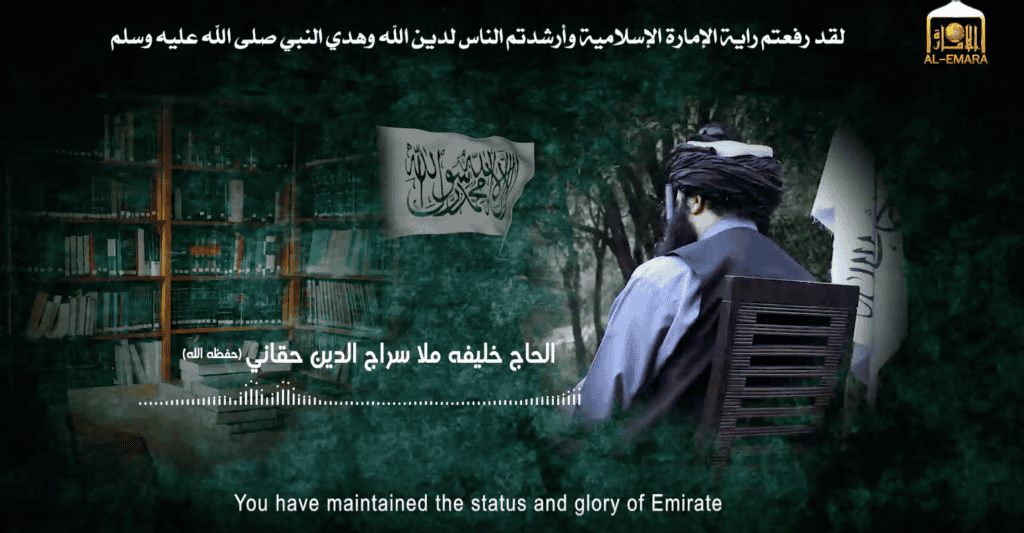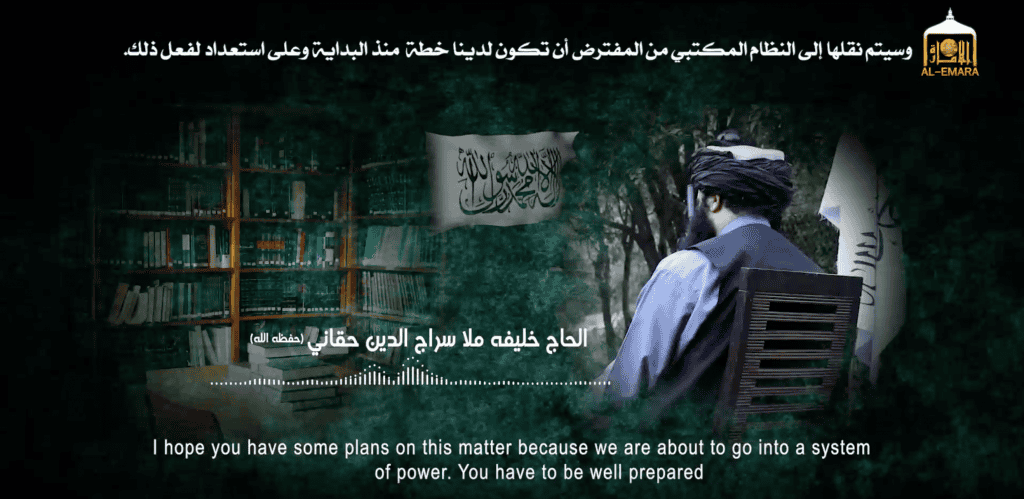
Sirajuddin Haqqani, the Taliban’s deputy emir, discusses the importance of the group’s judiciary system in a newly-released, 23-minute audio message. Haqqani, a U.N.-designated terrorist who is closely allied with al-Qaeda, addresses “all the religious scholars and teachers,” explaining why the Taliban’s courts are a core part of the Islamic emirate he and his men are building in Afghanistan.
“You have maintained the status and glory of [the] Emirate,” Haqqani tells the Taliban’s judges and religious instructors. “You have taught the religion of Allah (SWT) and the path of the Holy Prophet (may peace and blessings of Allah be upon him) to the people.”
Haqqani says the “respected Sheikh Noorullah” is the “head of all courts and the judiciary” for the Taliban’s Islamic emirate. Noorullah is purportedly “traveling to all the corners of the country, from south to north,” apparently to inspect the group’s judicial system.
The Taliban’s deputy emir calls on the judges to let him know if they “have problems that affect the work of [the] judiciary,” saying they should not be hesitant to contact him and demand resources when necessary. Haqqani wants them to travel throughout Afghanistan to dispense the Taliban’s version of justice.
Haqqani also tells the members of his audience to make sure their legal “works are connected” with the “organs” of the Taliban’s nascent government, saying the various “organs” should reach an “understanding” and coordinate their activities. He also describes these structures as “existing administrations.”
“If the other organ [is] not cooperating, let us know, we will make them cooperative,” Haqqani says, thereby indicating that he has the power within the Taliban’s organization to demand obedience. Haqqani explains that the Taliban’s “military commission” advises its fighters along these same lines in the “seminars and workshops” it holds for the rank and file.
Haqqani claims that how the public perceives the Taliban’s “system” is “based on you judges more than the military committee and the committee of dawa [proselytizing] and guidance and other committees,” a reference to the internal structure of the group’s nascent government. He adds that “His Excellency Sheikh Amir ul Mumineen” (the “Emir of the Faithful”), Haibatullah Akhundzada, has “much confidence” in them.

In an intriguing passage, Haqqani refers to some pending “urgent decisions” that the Taliban’s senior leaders are prepared to make regarding the locations of their courts. These “courts,” which are “built in deserts and villages will be transferred to the office system,” Haqqani tells the judges. It is possible that Haqqani is referring to the necessity of running courts in Afghanistan’s more urbanized provincial capitals and district centers, many of which have remained out of the jihadists’ grip while the U.S. and NATO forces remained in country. Establishing courts in some of these areas will require more effort, given that the population isn’t accustomed to Taliban-style rule.
“I hope you have some plans on this matter because we are about to go into a system of power,” Haqqani says. “You have to be well prepared. I wish successes for you in all your duties.”
Describes “complaints” concerning the Taliban’s court system
Haqqani discusses at length the “hardships” the Taliban’s judges have endured throughout all these years of war. He also encourages them to be careful in how they adjudicate matters, so that they do not earn the disapproval of Afghans.
“Allah has given the honorable judges a status in all systems, where if the system has a good or bad reputation, the main reason is the courts,” Haqqani says. “And because we have to take care of people’s affairs, we need to be very careful and attentive.” He encourages the judges to exercise “good manner[s]” when dealing with the people.
He advises the judges to “make sure” they “listen to people’s complaints and needs patiently,” because if they do “it will be a success for us.” Thus far, this has been difficult to do “because, on the one hand, there is an armed enemy [and] we are at war with them and on the other hand the appropriate security situation was not created.” He mentions the “security risks” facing judges, saying “they cannot eat and sleep comfortably.” The Taliban would appoint judges, only to have some of them imprisoned or killed, making it impossible to operate the sharia court system.
Haqqani is candid with respect to the shortcomings of the Taliban’s courts. He says that during the “previous emirate” — meaning when the Taliban ruled much of Afghanistan from 1996 to 2001 — most of the people’s complaints centered on the court system and the group’s department of “vice and virtue.” He concedes that there are “a lot of criticisms [of] our courts today.” Although he is reluctant to discuss them openly and “critically,” he does so because “we have to act with caution and accuracy.” Haqqani tells the judges that they “have received complaints” concerning how “the court’s decisions are often delayed,” as well as complaints regarding absentee judges.
Haqqani’s summary of the Taliban’s attempts to operate courts during the past two decades reveals that for all the group’s territorial gains over time, the jihadists still lacked the ability to truly govern. Haqqani clearly anticipates that will change in the coming months. He says Allah has promised them “victory,” and “[t]his future promise is coming.”
He mentions in passing a “draft law” that the Taliban’s judges have been operating under, apparently with the expectation that its courts will play a more prominent role in the future.
Preparing to rule
The Taliban has promoted two major speeches by Haqqani in the past two months. The speeches contain similar themes, Haqqani speaking more as a head of state than as a hunted terrorist.
In March, Haqqani addressed a “great assembly of mujahideen,” congratulating them on their battlefield successes. Much of his talk was clearly intended to prepare the jihadists for the Taliban’s transition from an insurgency to a government. The rise of the Taliban’s first emirate in Afghanistan in the 1990s was plagued by early rivalries and dissent, which Haqqani likely wants to stymie this time around. Haqqani encouraged the fighters to remain humble and obedient, while avoiding internal divisions.
“Officials should try to get the regulations of other commissions, study them carefully and familiarize themselves with them so that they do not clash with other departments,” Haqqani said in his March address. “Whenever a problem arose and we investigated, the fault was in [a] violation of the rules. If we follow the rules and regulations of all institutions, there will be no problems or conflicts.” Haqqani discussed at length the role of the Taliban’s “commissions” in administering the people’s affairs.
“The Islamic Emirate is the home of our faith and our religion, in which we are all united in a sacred bond,” Haqqani said. Haqqani is clearly preparing for the emirate’s rise once again.







